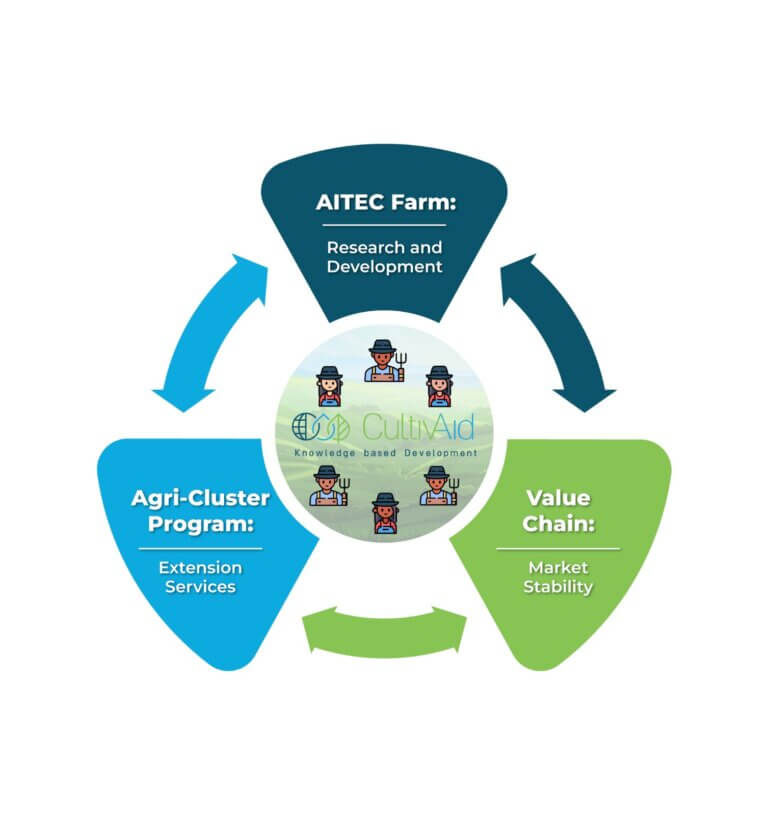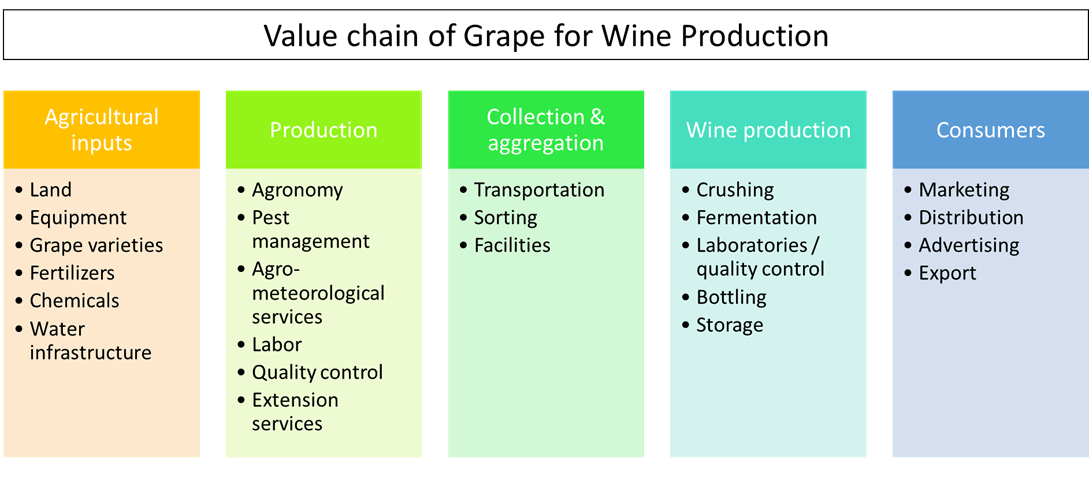CultivAid's Agricultural Helix
The agricultural helix is a conceptual framework that describes the dynamic relationship between agricultural research and development, agricultural extension and production, and Market development. This concept suggests that agricultural development is not linear but rather cyclical, influenced by various factors including technology, environmental factors, economic factors, and social dynamics.

Agricultural Innovation and Technology Center (AITEC) Farms
The Agricultural Innovation and Technology Centers operates as a central mechanism for agricultural development and for transferring technology and developing knowledge. The AITEC is a medium sided farm that enables regional access to improved agricultural inputs, mechanization, supply chains, access to knowledge and has impacts on value chains.
The farms are equipped with drip irrigation, sprinklers, greenhouses, seedling nursery, innovative technologies and apply advanced agro-techniques to demonstrate the potential Israeli technology has to offer. The sites are centers for trainings and facilitate the development of an agricultural knowledge infrastructure, training expert agronomists to lead the agricultural transformation.
The farm is a logistical Hub that promotes market linkages for value chain development. The hub serves to facilitate connections, collaboration and partnerships between local and international stakeholders. The hub ensures market access to agricultural inputs and technologies while simultaneously promoting post-harvest processing and export of local production.
For more Information visit https://aitecfarm.com/
Training and Internships Programs
CultivAid works to develop African Agronomists who can lead the Agricultural Transformation from within.
Our perspective is that there is no one solution for improving agricultural performance, but rather many actors and a variety of activities are required to transform an ecosystem for long term sustainable change. There is a need for both technical capacity (agricultural know-how and technical skills) and functional capacity (managerial and financial).
The transfer of technology must be accompanied by appropriate training programs that build capacity to enable wide scale adaptation. CultivAid provides a variety of basic and advanced agricultural training programs that emphasize hands on, practical work:
- CultivAid’s internship program for young agronomists An intensive 6 month program. Local agronomists work side-by-side their Israeli counterparts, working together sharing knowledge and a demanding work attitude. Graduates of the program represent a new generation of agronomists, required for building the agricultural ecosystem.
- 8-month and 3-year training program, Don Bosco Technical Institute
Collaboratively developed and jointly implemented with the Don Bosco Technical Institute. The program provides young people with knowledge and practical skills, along with the right altitudes for agricultural work. The program provides both theoretical and practical knowledge. - Vision Building and professional tours to Israel
- Professional practical Trainings that include irrigation, fruit trees, seedling development, fertilization and plant nutrition, mechanization, Crop specific agronomy, protected agriculture, nutrition-sensitive agriculture and more.
CultivAid's Agri Cluster approach
The Agri Cluster Approach is a cornerstone of CultivAid’s strategy to improve the productivity of farmers. At its core, we leverage farmer organization and economies of scale to enable supply chain connectivity, hands on agricultural education and extension.
The Agri Cluster Program aims to bridge the gap between agricultural research and farmer production. By disseminating agricultural knowledge, information, and best practices directly to farmers, extension services ensure that the latest research findings, technical assistance, training, and advisory services are accessible to those who need them the most, farmers. CultivAid’s team of local agricultural professionals provides these extension services through hands-on demonstration sites and continuous training programs.
The Agri Agent is a trusted member of the farming community who acts as the crucial link between farmers and CultivAid. This individual serves as the primary point of contact for ordering agricultural inputs, coordinating technical support and training, and facilitating improved market access. Through the cluster approach, these agents are identified and empowered, enabling CultivAid to reach thousands of farmers and create a significant impact across the entire agricultural system.
Value Chain Development
A value chain is defined as the full range of activities which are required to bring a product from production to consumption. Agricultural value chain is ideally composed of five main components i) Agricultural inputs and services, ii) Producers, iii) Collection and aggregation, iv) Processing or other post-harvest processing v) Market/Consumption.
Market and Value Chains are the driving force behind connecting farmers with buyers to ensure efficient and profitable agricultural value chains. This involves identifying market opportunities, facilitating market access, improving market linkages, and promoting market-oriented agricultural production.
Market-oriented agriculture emphasizes crop production based on market demand in terms of quality, quantity, and timing. Market development efforts aim to create market stability, mitigate the risk of agricultural production, and improve farmer incomes based on productivity and efficiency. CultivAid works with value chain actors to promote contracts and stability in exchange for higher quality products, promoting a win-win between farmers and processors.
CultivAid emphasizes the focus on the value chain for specialized high value crops and supports implementation and programs to ensure full operation of the value chain. CultivAid enables technical support beyond just agronomy and provides a more holistic approach that includes technical support to import technology and inputs, post-harvest solutions, establishment of agricultural processing , transportation of goods and providing a range of services to ensure the value chain is operating at optimal capacity.

